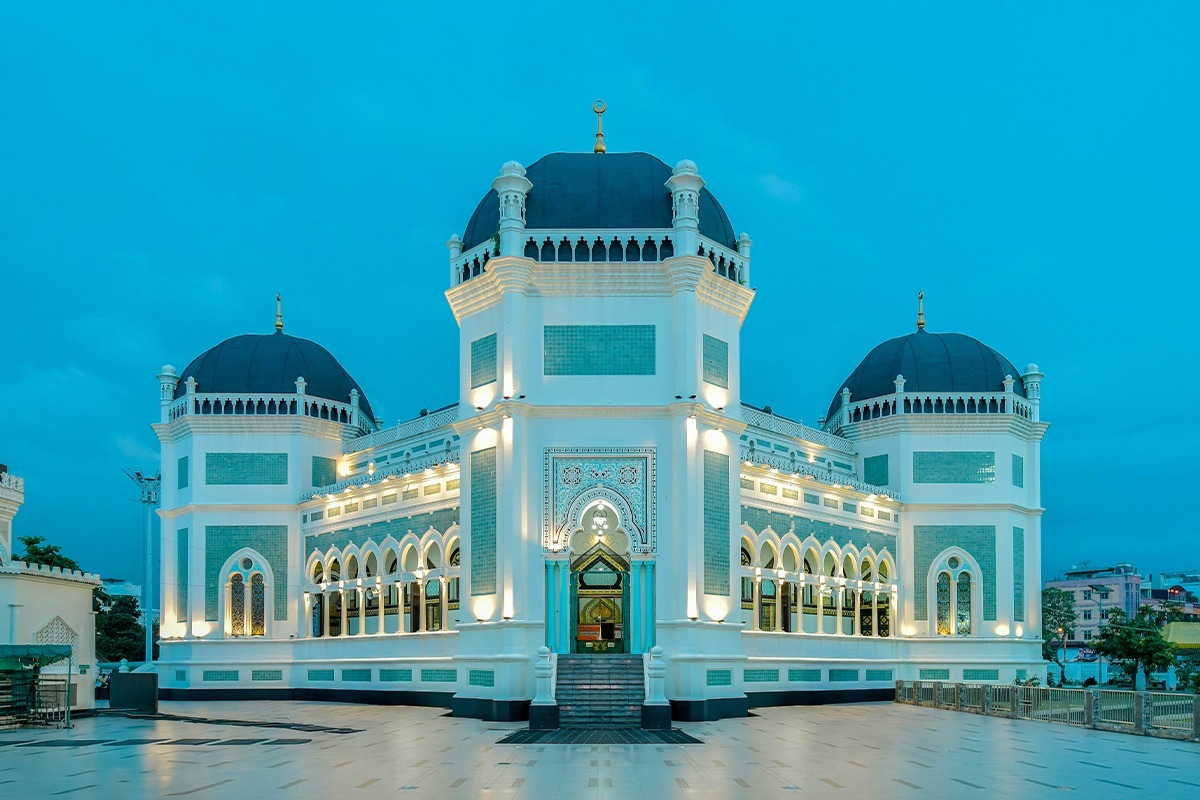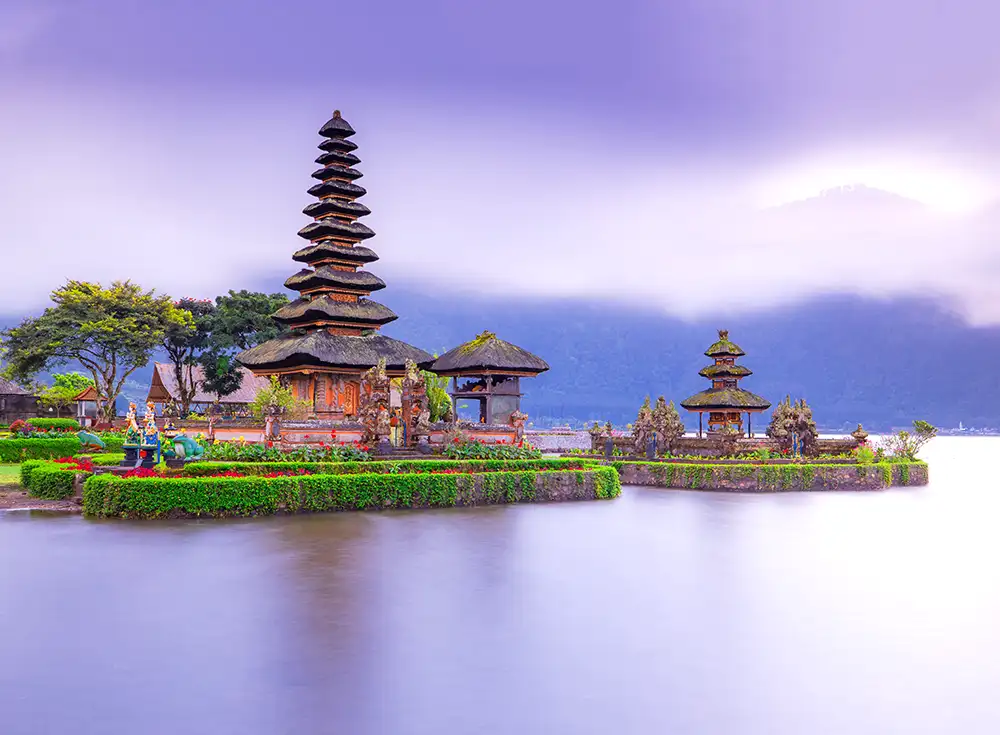Medan is the capital of Indonesia’s North Sumatra province. The huge Maimun Palace and octagonal Great Mosque of Medan dominate the city center, combining Islamic and European styles. Just north are Jalan Selat Panjang street, famed for its ethnic food stalls, and Tjong A Fie Mansion, a museum in a former Chinese merchant’s home. Southwest is the striking Indo-Moghul Catholic church of Graha Maria Annai Velangkanni.
The best time to visit Medan, the capital of North Sumatra, is during the dry season from May to September. During these months, you’ll experience less rainfall, pleasant weather, and better conditions for exploring the city and nearby attractions like Lake Toba and Bukit Lawang (for orangutan trekking).
Weather Overview:
- Dry Season (May – September): Warm and humid but with less rain, ideal for sightseeing and outdoor adventures.
- Wet Season (October – April): Expect frequent rain showers, especially from November to January, though mornings are usually dry.
Highlights by Season:
- May – September: Perfect for visiting Lake Toba, the world’s largest volcanic lake.
- June – August: Ideal for wildlife spotting at Gunung Leuser National Park.
- March – April & October: Shoulder seasons with fewer tourists but still decent weather.
✈️ How to Get to Medan, Indonesia:
-
By Air (Most Convenient)
- Kualanamu International Airport (KNO) is the main gateway to Medan, located about 39 km (24 miles) east of the city.
- Direct International Flights: Available from Singapore, Kuala Lumpur, Penang, Bangkok, and Hong Kong.
- Domestic Flights: Frequent connections from Jakarta, Bali (Denpasar), Surabaya, and other major Indonesian cities.
Transportation from the Airport:
- Airport Train (Railink): ~30 minutes to central Medan.
- Taxis & Ride-Share (Grab): 45-60 minutes, depending on traffic.
-
By Land & Sea
- From Lake Toba: ~4-5 hours by bus or private car.
- From Penang (Malaysia): Ferry to Belawan Port (near Medan), then a short drive.
🏞️ Top Attractions in Medan:
-
Maimun Palace (Istana Maimun)
- A 19th-century royal palace showcasing Malay-Islamic architecture.
- Open for visitors with exhibits of the Deli Sultanate’s history.
-
Great Mosque of Medan (Masjid Raya Al-Mashun)
- An iconic octagonal mosque built in 1906 with stunning Moorish, Indian, and Spanish designs.
- Open to non-Muslim visitors outside prayer times.
-
Tjong A Fie Mansion
- A beautifully preserved Peranakan Chinese mansion from 1900.
- Features artifacts, antiques, and a glimpse into Medan’s multicultural heritage.
-
Lake Toba & Samosir Island (Day Trip)
- The world’s largest volcanic lake, located 4-5 hours from Medan.
- Explore Batak culture, traditional villages, and scenic landscapes.
-
Bukit Lawang (Orangutan Sanctuary)
- Located ~3 hours from Medan, it's the gateway to Gunung Leuser National Park.
- Famous for orangutan trekking and eco-tourism adventures.
-
Graha Maria Annai Velangkanni
- An Indian-style Catholic church dedicated to the Virgin Mary.
- Unique Indo-Mogul architecture makes it a striking cultural landmark.
-
Medan Culinary Scene
- Merdeka Walk: Famous for street food and local delicacies.
- Must-try dishes: Soto Medan (spiced coconut soup), Bika Ambon (sweet cake), and Durian Ucok for fresh durian.
🎉 Activities to Do in Medan:
-
Explore Cultural and Historical Landmarks:
- Maimun Palace: Discover the royal heritage of the Deli Sultanate.
- Tjong A Fie Mansion: Learn about Medan’s multicultural past through this historic Peranakan house.
- Great Mosque of Medan: Admire the architectural beauty of this grand mosque.
-
Nature and Adventure:
- Bukit Lawang: Trek through Gunung Leuser National Park to see Sumatran orangutans.
- Lake Toba & Samosir Island: Swim, hike, or explore Batak culture on this massive volcanic lake.
- Sibolangit Waterfall (Two Colors Waterfall): Hike to this unique blue-and-white waterfall, about 2 hours from Medan.
-
Shopping and Local Markets:
- Medan Mall & Sun Plaza: For modern shopping, dining, and entertainment.
- Pasar Ikan Lama: Traditional market for textiles, handicrafts, and local souvenirs.
-
Relaxing Activities:
- Sipiso-Piso Waterfall: A breathtaking 120-meter waterfall near Lake Toba.
- Hot Springs at Berastagi: Soak in the volcanic hot springs after visiting Mount Sibayak.
🏨 Accommodation in Medan:
-
Luxury Stays
- JW Marriott Hotel Medan: 5-star comfort with panoramic city views, a spa, and infinity pool.
- Adimulia Hotel: Elegant rooms, rooftop pool, and central location.
-
Mid-Range Options
- Grand Mercure Medan Angkasa: Spacious rooms with modern amenities, near major attractions.
- Aryaduta Medan: Comfortable and stylish with a rooftop pool.
-
Budget-Friendly Stays
- Dazhong Backpacker Hostel: Affordable and sociable with a communal kitchen.
- Karibia Boutique Hotel: Modern and cozy, perfect for budget travelers.
🍽️ Food and Restaurants in Medan:
-
Local Delicacies to Try:
- Soto Medan: Coconut milk-based soup with chicken or beef.
- Bika Ambon: Sweet, chewy honeycomb cake.
- Durian: Medan is famous for fresh, creamy durian—try it at Ucok Durian.
- Nasi Padang: A variety of spiced dishes served with rice.
-
Top Restaurants & Street Food Spots:
- Ucok Durian: Legendary spot for fresh durian lovers—open late!
- Merdeka Walk: A bustling food court for street food and local dishes.
- Tip Top Restaurant: Colonial-era café serving Indonesian and Western cuisine.
- RM Sinar Pagi: Famous for authentic Soto Medan.
- Nelayan Restaurant: Popular for Chinese-Indonesian seafood and dim sum.
🌍 Local Culture in Medan, Indonesia:
Medan is a melting pot of cultures, which makes it a unique place to visit. The city reflects the diverse ethnic groups, religions, and traditions found throughout Sumatra, with a rich blend of Malay, Batak, Chinese, and Indian cultures. Here's an overview of what you can expect:
1. Ethnic Diversity
- Batak: The Batak people are indigenous to North Sumatra. Their cultural influence is strong in Medan, particularly around Lake Toba and Samosir Island. The Batak are known for their traditional music, dance, and ceremonies, as well as their unique architecture, especially their distinctive Batak houses with steeply pitched roofs.
- Malay: Medan has a significant Malay population, and you’ll see Malay influence in the language, food, and festivals.
- Chinese: The Peranakan or Straits Chinese community has been in Medan for centuries, contributing to the city’s culinary traditions, especially with dishes like bakmi (noodles), dimsum, and chinese-style roasted meats.
- Indian: Medan also has a significant Indian community, especially around the Little India area, where you’ll find a lot of Indian restaurants and shops offering spices, textiles, and jewelry.
2. Languages
- Bahasa Indonesia is the national language, but in Medan, you’ll also hear Batak, Mandarin, and Hokkien (from the Chinese community), as well as Tamil (from the Indian community).
- Medan Malay is a local dialect, slightly different from the standard Bahasa Indonesia, often used informally in everyday conversations.
3. Religious Diversity
- Islam is the dominant religion in Medan, with mosques such as the Great Mosque of Medan reflecting the Islamic influence.
- Christianity is significant here as well, particularly among the Batak people, with many churches scattered across the city.
- Hinduism and Buddhism are practiced within the Chinese and Indian communities, and you’ll find temples and festivals that reflect these traditions.
4. Traditional Arts & Crafts
- Ulos: A traditional Batak woven cloth, often used for ceremonial purposes, is an important cultural symbol in Medan. It’s given as a gift during weddings and special occasions.
- Gondang: Traditional Batak music, featuring drums and gongs, plays a significant role in Batak ceremonies and is often performed at weddings and other celebrations.
- Keris: A traditional Indonesian weapon used in cultural rituals, with ornamental designs. You can find beautifully crafted keris in markets and cultural stores.
5. Festivals & Celebrations
- Hari Raya Puasa: Celebrated by the Muslim community, marking the end of Ramadan, with prayers, feasts, and gatherings.
- Chinese New Year (Imlek): The Chinese community in Medan celebrates this festival with vibrant dragon dances, lanterns, and food.
- Christmas: Celebrated by the Christian community, with festive decorations and church services.
- Toba Batak Festival: A celebration of Batak culture held near Lake Toba, featuring traditional music, dances, and ceremonies.
6. Cuisine & Dining Etiquette
- Medan’s cuisine is a blend of Malay, Batak, Chinese, and Indian influences, with a focus on spicy dishes and rice-based meals.
- Eating with your hands: In some Batak and Malay traditions, it’s common to eat rice with your hands, especially when enjoying traditional Soto or Nasi Padang.
- Food Sharing: Meals in Medan are often shared, with several dishes placed in the center for everyone to enjoy together.
7. Dress & Behavior
- Medan is generally conservative, especially in terms of dress, due to the Muslim influence. It’s respectful to wear modest clothing when visiting religious sites like mosques and churches.
- Greetings: A handshake is common, but when greeting someone from a more traditional background, a slight bow of the head is appreciated.
8. Traditional Dance & Music
- The Gondang music ensemble, often performed at weddings and cultural events, features traditional drums and flutes.
- Tor-Tor dance: A traditional Batak dance, performed at festivals and ceremonies. The movements often tell stories or celebrate events.
🌏 Experiencing Medan’s Culture:
- Cultural Tours: Visit traditional Batak villages around Lake Toba, see the Tjong A Fie Mansion for a glimpse of Medan’s colonial and Chinese past, and witness the architecture at the Masjid Raya Al-Mashun.
- Local Markets & Shopping: Explore local markets like Pasar Ikan Lama for handicrafts, batik, and local spices.
- Culinary Exploration: Dive into local dishes like Soto Medan and Bika Ambon, and try Durian at Ucok Durian for an authentic experience.



